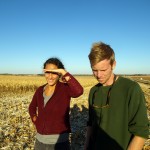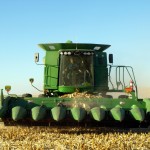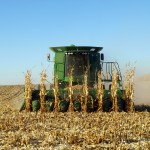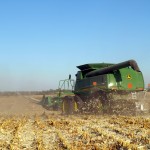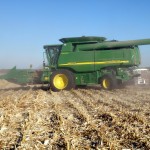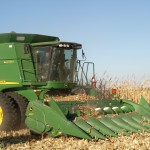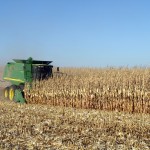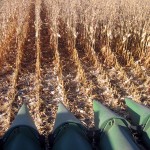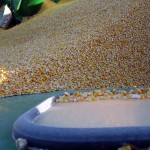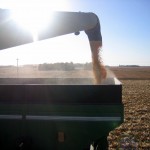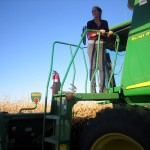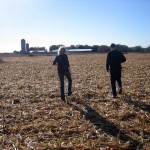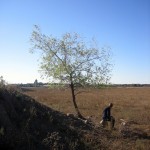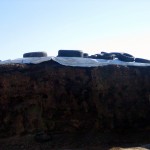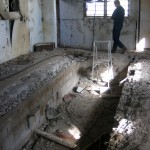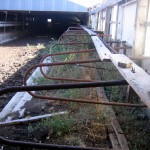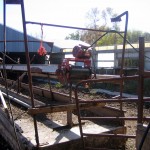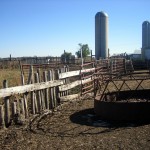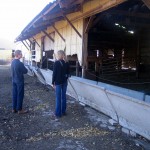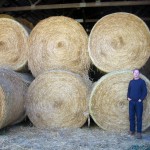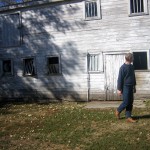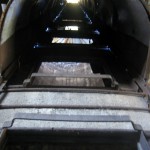Matthew and I made many stops on our drive out to Cella & Emmet’s wedding. One of the truly special places we visited was the Borgendale Farm in Montevideo, Minnesota. This is the farm where Anne Borgendale (Cricket Creek Farm 2011 intern) grew up. The farm has been in Anne’s family for 140 years – she and her siblings are the 5th generation on this land. The drive out to the farm was fully narrated by Anne. Anyone who knows Anne, knows that she is a wealth of information (that’s even an understatement! She’s a trivia whiz!).
The first thing we learned about was “SNURT”, refers to black bare dirt that blows since it is so windy on the prairie and there is so much exposed soil. Seriously exposed. Not only the soil, but there is an immense feeling of exposure and openness out there. No hills, few trees. Out there in the prairie, the only trees that are there now are the ones that were planted by people. Many families have small groves planted around their houses – especially on the North and West sides, to protect from the prevailing winds. The rest is crop land – less than 1% is still native prairie.The soil out there is very fine – old glacial lake bottom. Because of this, it is prime land for growing sugar beets. Interspersed between the corn fields, there were huge fields of sugar beets. We were driving just at the start of the beet harvest season. If you are driving behind a beet truck on the way to the “beet dump” keep your distance – you don’t want any escaping beets coming through your windshield! Whats a beet dump? It is literally a mountain of beets with pipes running through it to keep it cool. Other than the beets, it is mostly corn and soybeans. Very few dairy farms are even left out there. We drove past many farms like looked like old dairies, but Anne assured us that most of the silos and barns were empty.
Throughout Anne’s childhood, her father managed the farm – 200 milking cows. There were just a few hired hands – someone who did the morning milking, someone who did the afternoon milking, someone who did field work, repairs and maintenance, and then Anne’s father who took care of cow health. But of course, it was a family operation. Anne and her siblings helped collect milk for test days, participated in calf care, and helped putting up their stored forage. Anne’s father passed away suddenly 8 years ago, and her family sold the cows and much of the equipment soon after. Despite the fact that the tour of the farm had a sadness to it – quiet with no animals, a skeleton of a milking parlor, buildings in need of repair, it also had so much beauty. It felt so full of a rich history. An evolution of a farm that has been through so many changes, adapting as agriculture changed but always remaining a family business. When Anne was 10 years old she would walk out into the pasture after school and bring in the 100 dairy cows. Yes, little Anne Borgendale bringing in 100 cows to be milked.
click on images to view full size.
After touring the farmstead and pastures, we met up with Gary, who used to work for Anne’s father but now rents the land and crops it. He was harvesting corn, and invited us to ride around with him in the combine. Neither Matthew nor I had ever done anything like that before – walking up the steps into the cab I felt like I was boarding a private jet. We drove along for six passes as the huge cone shaped teeth ate up the corn stalks, sorted the kernels, and shot all the residue out the back. A true monster of a machine. This world of corn is so foreign to me, but so deeply penetrating to much of this country. The harvest is early this year since it has been so dry. Here in Massachusetts, the corn that is being grown is strictly for animal feed and gets chopped instead of combined. Here the entire plant it harvested and becomes silage, while the corn out there the stalks are left in the field, although sometimes they are raked into windrows and then baled up. A different world? Indeed.
When Anne first inquired about an internship here, back in the winter of 2011, she outlined in her email the different farm tasks that she took part in while growing up – tractor work, calf care…. That was followed by something that struck me at the time, and still sticks with me. She said, ” I’m also quite familiar with the whole family effort that goes into making a farm run, and that it is a lifestyle, not a job.” While working with Anne last year, my mind often drifted back to this. She is someone who embodies this philosophy, and inspires me to do the same. Growing up on a farm instilled this impressive work ethic into her. She truly works until the job is done, and even when all the immediate tasks are done, other bits of agriculture weaved through the rest of her life here.
Thanks Anne for showing us your roots!

